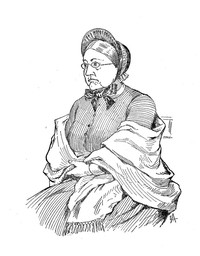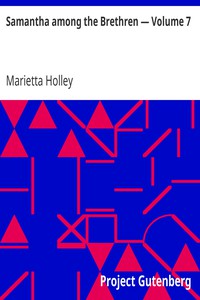Samantha Among the Brethren, Complete by Marietta Holley (the beginning after the end read novel .txt) 📗

- Author: Marietta Holley
Book online «Samantha Among the Brethren, Complete by Marietta Holley (the beginning after the end read novel .txt) 📗». Author Marietta Holley
In view of the frequent reference, in this work, to the discussion in and preceding the General Conference of the Methodist Episcopal Church of 1888, in regard to the admission of women delegates, the publishers have deemed it desirable to append the six following addresses delivered on the floor of the Conference during the progress of that discussion.
The General Conference of the Methodist Episcopal Church is the highest legislative body of that denomination. It is composed of delegates, both ministerial and lay, the former being elected by the Annual Conferences, and the latter by Lay Electoral Conferences. The sessions of the General Conference are held quadrennially.
Prior to the session held in May, 1888, in New York City, women delegates were elected, one each, by the four following Lay Electoral Conferences—namely, The Kansas Conference, The Minnesota Conference, The Pittsburgh Conference, and The Rock River Conference. Protest was made against the admission of these delegates on the ground that the admission of women delegates was not in accord with the constitutional provisions of the Church, embodied in what are termed the Restrictive Rules. A special Committee on the Eligibility of Women to Membership in the General Conference was appointed, consisting of seventeen members, to whom the protest was referred. On May 3d the Committee reported adversely to the admission of the four women delegates, the report alleging “that under the Constitution and laws of the Church as they now are, women are not eligible as lay delegates in the General Conference.” From the discussion following this report, and lasting several days, the following six addresses, three in favor of and three against the admission of the women delegates, are selected and presented, with a few verbal corrections, as published in the official journal of the Conference.
ADDRESS OF REV. DR. THEODORE L. FLOOD.
I am in accord, in the main, with Dr. Potts and Dr. Brush in what they have said on this question, unless it may be where my friend who last spoke said that these ladies, these elected delegates to this body, ought to be admitted. My judgment and my conscience before the Discipline of the Methodist Episcopal Church and the Restrictive Rules is that these women elected by these Electoral Conferences are in this General Conference.
Their names may not have been called when the roll was called, and yet it was distinctly stated by the Bishop presiding that morning that they would be called, and the challenges presented with their names; and afterward demanded it, the names of these delegates who were not enrolled with the others were called, and the protests were read. Their names have been called as members of this body, and they are simply here as “challenged” members. From that standpoint this question must be discussed, and any disposition of this case under the circumstances must be in this direction. These women delegates must be put out of this General Conference if they are not granted the rights and privileges of members here. It is not a question of “admitting” them. Before this report, before the bar of history, we stand, and will be called upon to vote and act, and millions of people will hold us responsible, and I dare say that our votes will be recorded as to whether they shall be “put out” or “stay in.”
Why, sir, the government of the Methodist Episcopal Church exists for the ministry and membership of the Church. The ministry and the membership of the Church do not exist for the government. The world was made for man, and not man for the world. That is the fundamental idea in the government of God, as He treats us as human beings. That is the fundamental idea in the government of the Methodist Episcopal Church, as we are enlisted in the support of that government as ministers and members of the Church. Now under this system of ecclesiastical government a time came in our history when we submitted a grave question to the membership of the Church. It was not a question simply of petition, asking the membership to send petitions up to the General Conference. On the contrary, it was submitting a constitutional question not simply to the male members of the Church, for that grand and noble man of the Methodist Church, Dr. David Sherman of the New England Conference, moved himself to strike out the word “male” from the report of the Committee on Lay Delegation. It came to a vote, and it was stricken out, two to one in the vote. When that was done, then the General Conference of our Church submitted to the membership of the Church the question of lay delegation. But back of the question of lay delegation was as grave a question, and that was granting the right of suffrage to the women of the Church. The General Conference assumed the responsibility of giving to the women the right to vote. It may be questioned this way; it may be explained that way; but the facts abide that the General Conference granted to the women of the Church the right to vote on a great and important question in ecclesiastical law. Now if you run a parallel along the line of our government—and it has often been said that there are parallels in the government of the United States corresponding to lines of legislation and legislative action in the government of the Church—you will find that the right of suffrage in the country at the ballot-box has been a gradual growth. One of the most sacred rights that a man, an American citizen, enjoys is the right to cast a ballot for the man or men he would have legislate for him; and for no trivial reason can that right, when once granted to the American citizen, be taken away from him. Go to the State of Massachusetts, and trace the history of citizen suffrage, and you find it commenced in this way: First, a man could vote under the government there who was a member of the Church. Next, he could vote if he were a freeholder. A little later on he could vote if he paid a poll-tax. In the government, and under the legislation of our Church, first the women were granted the right to vote on the principle of lay delegation, not on the “plan” of lay delegation, but on the “principle” of lay delegation. That was decided by Bishop Simpson in the New Hampshire Conference, and by Bishop Janes afterward in one of the New York Conferences. On the principle of lay delegation, the women of the Church were granted the right of suffrage; presently they appeared in the Quarterly Conference, to vote as class-leaders, stewards, and Sunday-school superintendents; and it created a little excitement, a feverish state of feeling in the Church, and the General Conference simply passed a resolution or a rule interpreting that action on the part of women claiming this privilege in the Quarterly Conference as being a “right,” and it was continued. Presently, as the right of suffrage of women passed on and grew, they voted in the Electoral Conferences, and there was no outcry made against it. I have yet to hear of any Bishop in the Church, or any presiding elder, or any minister challenging the right of women to vote in Electoral Conferences or Quarterly Conferences; and yet for sixteen years they have been voting in these bodies; voting to send laymen here to legislate; to send laymen to the General Conference to elect Bishops and Editors and Book Agents and Secretaries. They come to where votes count in making up this body; they have been voting sixteen years, and only now, when the logical result of the right of suffrage that the General Conference gave to women appears and confronts us by women coming here to vote as delegates, do we rise up and protest. I believe that it is at the wrong time that the protest comes. It should have come when the right to vote was granted to women in the Church. It is sixteen years too late, and as was very wisely said by Dr. Potts, the





Comments (0)